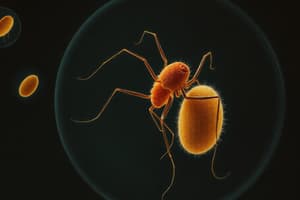Podcast
Questions and Answers
What causes Texas cattle fever, also known as Red water fever, Tick Fever, and Nantucket Fever?
What causes Texas cattle fever, also known as Red water fever, Tick Fever, and Nantucket Fever?
Babesia spp.
Which apicomplexan parasite is responsible for causing Malaria?
Which apicomplexan parasite is responsible for causing Malaria?
- Plasmodium (correct)
- Leishmania
- Babesia
- Toxoplasma
Malaria is the leading cause of mortality worldwide.
Malaria is the leading cause of mortality worldwide.
True (A)
The vector responsible for transmitting Babesia spp. is Ixodes scapularis ________.
The vector responsible for transmitting Babesia spp. is Ixodes scapularis ________.
Match the following medically important Plasmodium species with their characteristics:
Match the following medically important Plasmodium species with their characteristics:
Flashcards are hidden until you start studying
Study Notes
Blood Sporozoans
- Phylum Apicocomplexa: characterized by the presence of an apical complex to invade host cells, obligate intracellular parasites
- Life cycle includes sexual reproduction (sporogony) in arthropod vector and asexual reproduction (schizogony) in man
- Species: Babesia spp. and Plasmodium spp.
- Babesia spp. causes Texas cattle fever, Red water fever, Tick Fever, and Nantucket Fever, transmitted through the bite of Ixodes scapularis ticks
Malaria
- Translates to "bad air"
- Leading parasitic disease that causes mortality worldwide
- Acute febrile illness, symptoms appear 10-15 days after infective mosquito bite
- Symptoms: fever, headache, chills, which may be difficult to recognize as malaria
- Malaria is endemic in over 90 countries, with at least 90% of deaths occurring in Africa
- Estimated 229 million cases of malaria worldwide in 2019, with 409,000 deaths
- Children under 5 years old are the most vulnerable group, accounting for 67% of all malaria deaths
Plasmodium spp.
- Causative agent of malaria
- Four medically important species to humans: P.falciparum, P.vivax, P.ovale, and P.malariae
- P.knowlesi, normally a parasite of long-tailed macaques, also infects humans in the Philippines and Southeast Asia
- P.falciparum: most common in the Philippines, predominant species worldwide
- P.vivax: most widely distributed malarial organism
- Mixed infection with P.falciparum and P.vivax possible
Life Cycle of Plasmodium spp.
- Asexual cycle (schizogony) in man: sporozoites infect liver cells, mature into schizonts, rupture, and release merozoites
- Merozoites enter circulating RBCs, grow as ring forms, mature into trophozoites, and eventually form schizonts
- Some merozoites develop into gametocytes, which are ingested by female Anopheles mosquitoes during feeding
- Sexual cycle (sporogony) in female Anopheles mosquito: gametocytes penetrate macrogametes, forming zygotes, which develop into oocysts
- Oocysts grow, rupture, and release sporozoites, which make their way to the mosquito's salivary glands
- Infective sporozoites are inoculated into new human hosts, perpetuating the malaria life cycle
Symptoms and Pathology of Malaria
- Recurrent fever, chills, and sweating (paroxysms) every 36-72 hours
- Anemia, large spleen, and joint pain
- P.falciparum infection can be fatal, causing cerebral malaria and blackwater fever
- P.vivax, P.ovale, and P.malariae infections are generally less severe
Diagnosis of Malaria
- Determination of parasitemia through thick and thin smears
- Thick smears: count parasites per 200 WBCs, or per 500 WBCs if fewer than 10 parasites are identified
- Thin smears: determine percentage of infected RBCs
- PCR assay and molecular characterization can be used to identify parasite species
Studying That Suits You
Use AI to generate personalized quizzes and flashcards to suit your learning preferences.



